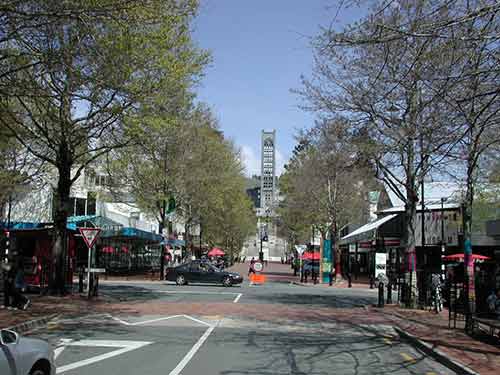
Two weeks ago, “The Nelson Anglican Diocese publically declare[d] itself to be in impaired fellowship with the province of the ACANZP”. Now the Standing Committee of the Nelson Diocese clarifies that motion:
At its recent Synod the Diocese of Nelson voted overwhelmingly to remain in fellowship with the Anglican Province of Aotearoa, New Zealand and Polynesia, rejecting suggestions for practical withdrawal from fellowship. However, recognising with sadness and disappointment the move by some within the wider church away from the traditional orthodox theology that is foundational to our doctrines, Synod acknowledged the strained (but not broken) relationship that now exists with some over matters of theology and practice.
A modified constitutional declaration of adherence and submission, allowed for under church law, was approved to signal this disappointment, enabling those concerned about the move away from orthodox theology to make the declaration in good conscience and remain within the church.
It is good that the Nelson Diocese has finally acknowledged its impaired fellowship with the rest of the Anglican Church because of its theology and practice. Here are just a few of Nelson’s impairing practices:
- Having a Baptist minister preside at the Eucharist in the Nelson Cathedral
- Abandoning the agreed lectionary in many parishes and ministry units
- The requirement of the use of bread and wine as the elements for communion being more honoured in the breach than in the observance
- Disposing of the consecrated bread and wine in the manner contrary to that required by our formularies (agreed teaching and practice)
- …
If Nelson understands its “modified constitutional declaration of adherence and submission” as having a different effect then, contrary to Nelson’s Standing Committee’s contention, their declaration certainly is not “allowed for under church law”.
As far as I can see, you cannot have it both ways. Either, Nelson’s “modified constitutional declaration of adherence and submission” are words having a different effect from those in our Church’s Constitution, thereby satisfying the intentions of the Nelson Diocesan Synod and its Standing Committee but not that of our Church’s Constitution. Or they have the same effect as those in the Constitution, and hence do not fulfil Nelson’s intentions of “signal[ing] disappointment” and enabling those who couldn’t sign what the Constitution requires “to make the declaration in good conscience”.
Our Constitution requires that the declaration of adherence and submission be in the words as given in the Constitution “or in words to the like effect”. This will be tested relatively soon. Bishop Richard Ellena retires at the end of this year. My understanding is that a new Bishop of Nelson cannot be appointed if that person does not make the declaration of adherence and submission required by our Constitution.
Many were upset that the Nelson Diocesan Synod made no acknowledgement of God’s inestimable love for LGBT+ people, no acknowledgement of their suffering, and no acceptance of Christian complicity in that. Some tried to defend this by speaking of a messy process. That excuse no longer holds – the Nelson Standing Committee, aware of whatever dynamics were at work at the Diocesan Synod, has failed to remedy this.
In fact, the Standing Committee statement makes absolutely no mention of what the Nelson motion is about – and my list of Nelson’s breaches of orthodox and Anglican doctrine, theology, and practice highlights what is really at stake. Whilst some may continue to try to maintain that this is not about homosexuality, but that this is about orthodoxy and orthopraxy and keeping to our vowed-to and signed-about agreements, the above list of bullet points makes that position untenable.
Ps. It always fascinates me that people, including (especially?!) church leadership, struggle to get our church’s name right: The Anglican Church in Aotearoa, New Zealand and Polynesia. “The province of the ACANZP” in the Nelson motion became “the Anglican Province of Aotearoa, New Zealand and Polynesia” in the Nelson Standing Committee’s statement.
As per the first link in this post, further background can be found here:Nelson’s Impaired Fellowship
If you appreciated this post, do remember to like the liturgy facebook page, use the RSS feed, and sign up for a not-very-often email, …
image source: Nelson Anglican Cathedral




I hope the ultimate outcome will be disimpairment, or at least a very nominal impairment…
I saw a report about the Arch Bishop of Sydney’s visit and letter to the Anglican Church in New Zealand.
He seemed to be gently dictating to the Church a way forward which would divide the Church into two groups, one of traditionalists and one of liberals, in an impaired communion with each other.
I don’t know enough about the Church in New Zealand to comment here, but if he came to the UK with a similar message, I wonder what sort of reception he’d receive.
I understand that he is part of GAFCON, which is trying to get a foot hold here and is encouraging churches to virtually schism from the CofE, or at least to withhold funds from their diocese.
This ignores the great majority of us who are actively seeking and praying for unity.
Their unfortunate rhetoric is getting an audience in some quarters and a number of churches have broken away in everything but legal status. It seems that Ordained Clergy involved, want to retain their comfortable vicarages and pensions and not so far, go out into the wild.
Thanks, Ernie. I don’t know any details – I think this is the proposal here. Blessings.